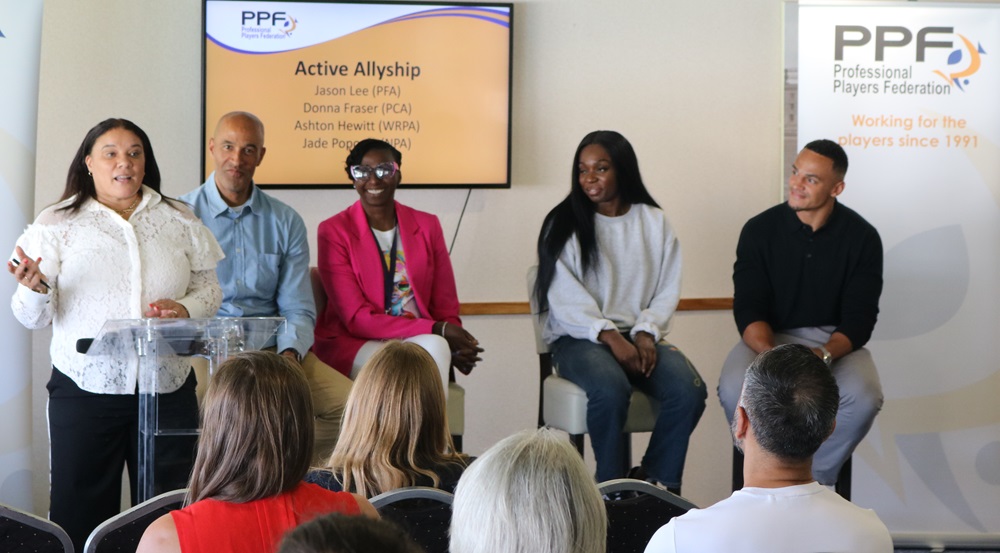

Simone Pound has chaired the PPF’s EDI Committee since it was formed in 2023. In her role as Director of Equality, Diversity and Inclusion (EDI) at the Professional Footballers’ Association (PFA), Simone has worked at the forefront of many campaigns to tackle discrimination in football and was appointed a non-executive director of the PCA in September 2022. Following the recent PPF Inclusion In Sport Week, we caught up with her to find out more about her work and the priorities for the EDI Committee.
How has your role developed since joining the PFA in 2000?
My initial remit was around the development of women’s football, supporting the first professional women’s team. I then worked with PPF Chair Brendon Batson with the Kick It Out anti-racism campaign which was founded by the PFA and then Commission for Racial Equality. After the 2010 Equalities Act my remit broadened to develop equality standards for all protected characteristics. A key area of development has been the peer-to-peer EDI education programme which has now been delivered to over 10,000 players over the course of ten years. This experience led me to FIFPRO’s EDI Working Committee and also to working closely with colleagues in the US supporting their player D&I work.
What have been the key challenges in your role?
One of the main challenges is translating player experiences into boardroom action and tangible change. A key part of my role at the PFA is ensuring players are involved in the work that we do on their behalf and bringing stakeholders along on the journey. Lived experiences and allies are really helpful for bringing about change, but I’ve found that it’s also about talking in a way so that people want to join in not push back.
Having the union around the table talking to the league and club representatives is important. By working with the unions, sports can ensure the players are involved and that their experiences are listened to and acted upon.
What is the most enjoyable aspect of your role?
I really enjoy working with my team. We started as a department of one and now the PFA has a team of six which is fantastic and shows the importance of EDI within football. A lot of people in EDI work on their own, so I’m blessed to have such a great team especially as it’s a challenging space so we can help support each other.
Why was the PPF EDI Committee set up?
We’ve seen the success of the PPF’s different committees, and we felt it would be useful for associations to come together and look at D&I issues. It’s been well received, and every meeting has had an effect. We are a committee that supports each other with any issues that we’re having and work together to find solutions. We’re not here to tell anyone what to do, but rather to learn from each other, after all nobody knows everything as it’s an ever-evolving space.
What are the key areas you’ve addressed as a Committee?
We’ve identified four key areas to focus on: Recruitment, Data, Communications & Engagement and Learning & Development.
Data is a fundamental pillar of work we need to do as it’s an area that most sports are lacking in so a shared data drive is really important. From a recruitment perspective, there are key things that best practice recruitment must consider to ensure an inclusive environment and workplace. I think it’s really important that sometimes sport should look externally at what other industries are doing for their employees and customers.
What were the highlights of Inclusion In Sport week?
This was a great opportunity for us to come together in person and create some shared learning opportunities and some of the most useful conversations are not necessarily in structured environment. It was also really important to hear lived experience from players and leadership perspectives; hopefully the whole week set the tone for the PPF’s commitment to EDI. I would urge as many to get involved as possible so that it’s not just the usual perspectives and that more people are brought into conversation to make change. Nobody can do this on their own.
What do you see as future priorities in the EDI space?
Intersectionality of all the characteristics is really important as a lot of the work we do crosses over. Faith is something we want to address and recognising shared values is going to be a fundamental part of progress. Also, as we highlighted at the PPF Inclusion in Sport week, neurodiversity in sport is an important issue. In the past, professional athletes have not considered themselves to be disabled but there are a lot of neurodivergent athletes and working to break down the stigma is vital. Unfortunately, gender is still a prevailing issue and challenging misogyny and sexism remains important, there are still some dangerous narratives in these areas.